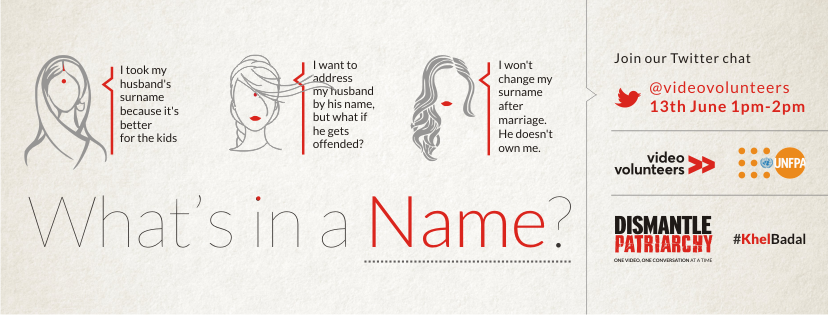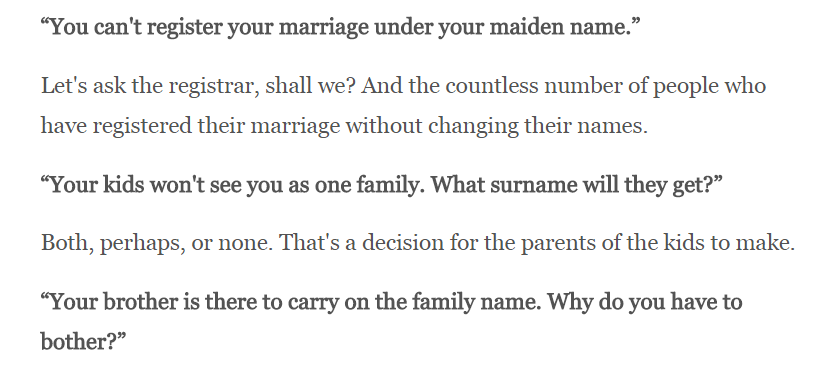The patriarchal politics of names and how it undermines women's rights and identity.

One of the first things you learn how to write as a child is your name. Those lines gingerly traced out the first time evolve into bold strokes as you sign them on cheques, driver’s licenses, passports and other official documents that identify you as an individual. The collective sum of your unique personality traits, and your lineage held together by two words – your first and last names.
Isn’t it a strange thing then, to have taboos and societal mores thrust on it? And yet, a child usually bears the last name of their father, as if mom had no role to play. In many cultures of the world a woman will change her last name after marriage to her husband’s. And in India we take it a step further, women aren’t supposed to address their husband by their first name. All three have one thing in common -- the perpetuation of the idea that women do not have an identity independent of the men in their lives. Patriarchy.
Imagine not being able to say the name of the person you plan your life with; have children with; grow old with? The rationale behind this tradition is that a man is the embodiment of God and to call him by name is to disrespect him. To call his name will immediately send a lightening bolt of death towards him.
In many parts of the country a woman will go to great lengths to avoid saying her husband’s name and even that of elder men in the family. Instead she will use a pronoun or ‘father of my child’. She earns the approval of society for being a dutiful wife who has made sure that her husband has a long and healthy life. From Chhattisgarh to Maharashtra to Uttar Pradesh women affirm that social pressure to respect one’s husband, and a fear of the consequences of not following the norm keep this practice alive.
While many men also reciprocate the tradition by not calling their wives by their names, they face far lesser censure, if any, when they don’t follow the practice. Society is far less accepting of women, like Malati Mahato, who do away with the practice. A kangaroo court sentenced Malati to being ostracised from her family and the entire village after she addressed an in-law by his name last year. No man would ever be shunned for such a thing.
[embed]https://www.youtube.com/watch?v=sayVVhy02lE&feature=youtu.be[/embed]
Increasingly though, women recognise that if ‘respect’ is what this denotes then they too should be respected by their husbands. A group that gathered in Chhattisgarh to talk about the issue says that the practice should be discontinued, and they hope that the girls of this next generation will lead the way.
[embed]https://www.facebook.com/VideoVolunteers/videos/10154459839681338/[/embed]
The patriarchal grip over the choice to say someone’s name or to choose your own name, is by no means limited to rural India. The urban elite, the urban middle class, the ‘women’s equality’ brigade (those who think identifying as a ‘feminist’ is a terrible thing), are all plagued by the itch to change their name after they’re married. Why of course, it’s better for the children; it’s also convenient when you don’t have to explain to half the world why your last name isn’t the same as your husband’s. How else would people know that you no longer belong to your father, and now you belong to your husband?
“I think patriarchy plays a trick on women by not giving them property and by not expecting them to have a name. When women don’t have property, their own home, and their own name, they cannot develop self-esteem, self confidence and their own identity,” says feminist, author and social scientist Kamla Bhasin on the issue.
[embed]https://www.facebook.com/VideoVolunteers/videos/10154460177166338/[/embed]
It doesn’t matter then that you quite like how your name sounds; that it’s the skin you’re comfortable in. There is no legal compulsion to do this, and yet many carry on this tradition. Those of us who choose to do something different, like add our mother’s name to our last name, keep our maiden name, or just drop our last name often have an exhausting battle ahead of us. As this exasperated woman points out she’s heard some gems for not changing her name after marriage.

It is indeed bizarre that in this day and age a woman still has to struggle to retain an identity independent of the men in her life. What’s in a name? The unmistakable scent of patriarchy, don’t you think?
Join us on Twitter @videovolunteers on June 13, 1-2pm to explore What’s In A Name?
This story is part #KhelBadal, Video Volunteers’ campaign to dismantle patriarchy, one video, conversation at a time. #KhelBadal is partly supported by UNFPA | Article by Kayonaaz Kalyanwala
Fixing India| Catching A Human Trafficker| Featuring Navita Devi|
Because of Navita's determination and bravery, a human trafficking agent is being the bars, and the girls have returned to their homes.This is how our CC’s are helping raise issues and finding solutions.
Self-Help groups unable to reach their potential
In Udaipur village of Harhua block of Varanasi district, the Mahalaxmi Self Help Group was formed 3 years ago, but they could not operate independently, because of the high handedness of the village head and the laxity of the Government officials.

